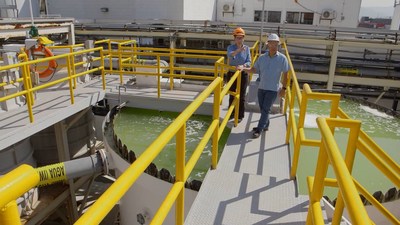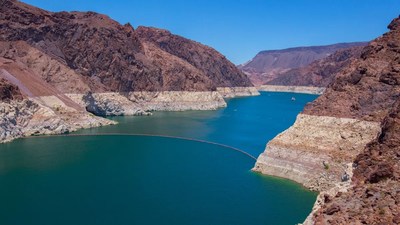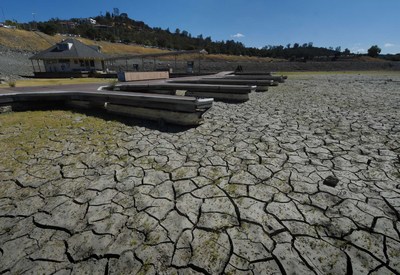WATER: We Have Too Much, But Not Enough - To Air On The Science Channel And MotorTrend TV
Toyota is addressing the critical water scarcity challenge in the U.S., where only 3% of the world's water is fresh and accessible. Agriculture consumes 70% of available fresh water, emphasizing the need for conservation. The company is leading efforts in water efficiency, particularly in manufacturing, aiming to become carbon neutral by 2035. A program titled "WATER: We Have Too Much, But Not Enough" will premiere on June 17, showcasing innovative water management solutions in its manufacturing processes, narrated by Adrian Grenier. The program aims to explore the intersection of climate change and water access.
- Toyota's commitment to reducing water usage aligns with sustainability goals, especially in water-stressed regions.
- The upcoming program highlights Toyota's efforts in innovative water management, potentially enhancing brand reputation.
- By focusing on water conservation, Toyota is mitigating risks associated with water scarcity in manufacturing.
- None.
NEW YORK, June 15, 2022 /PRNewswire/ -- Water – it's one of the greatest challenges all nations face today. Though it covers about
Globally, families and households consume only a fraction of the available fresh water. Agriculture uses
Potentially compounding the water crisis in America is a new urgency to "build it here" and help reduce the nation's dependence on global supply chains for core products. New industrial complexes, such as those for battery and semiconductor chip plants, and the expansion of existing automotive centers to build electric vehicles, are evidence of this trend. These are all water-intensive projects and are being built in the U.S. right now.
Toyota has long been a leader in using less water to produce its vehicles, a practice of growing importance especially in water-stressed areas, such as California, Texas and Mexico.
"At Toyota, we know our collective future – our health and well-being – depends on our ability as a society to focus on collective issues, like the reduction of water," said Kevin Butt, Toyota Motor North America's environmental sustainability director. "To solve our own puzzle, we aggressively explored a variety of options to find the one that would best meet our needs and, in this case, it was clear the fastest way to reduce the greatest amount is by collecting and reusing water in addition to reimagining our manufacturing process."
The technology and innovation to capture rainwater to use over and over again in manufacturing is here now, and we will take a close look at how brilliant minds are determined to help solve these important water access issues.
Dedicated scientists and researchers are determined to help solve these important water access issues.
WATER: We Have Too Much, But Not Enough, zooms in to examine the latest science, learnings and developments undertaken by one of the nation's largest manufacturers aiming to become carbon neutral in its facilities by 2035, in the world premiere set to air on June 17 at 5 p.m. (ET/PT) on the Science Channel and June 23 at 2:30 p.m. (ET/PT) on MotorTrend TV and on demand on the Discovery Science GO APP.
The program is narrated by Adrian Grenier with reports from Neka Zang at distressed areas in California.
How does climate change affect access to clean water throughout the United States, especially in drought-prone regions? How can we reduce the amount of water we consume every day while new manufacturing plants and assembly centers moving in can use the latest innovations and technologies to help reduce the water they use?
This program looks at the issues and then brings together experts to pool their knowledge and resources to help offer solutions.
In this program, we will look behind the scenes at Toyota Motor North America where work is underway to meet the goal of becoming carbon neutral in its manufacturing plants in North America by 2035 is in full force, including transferring its manufacturing centers' energy sources to wind, hydroelectric and solar power. As the world's largest automobile manufacturer, Toyota is setting the tone and providing environmental leadership to its suppliers, dealers and customers, along with sending a strong message to its future employees at universities and trade schools.
Viewers will have the opportunity to see it on the following schedule:
(Check local listings)
Science Channel: | June 17 at 5:00 PM ET/PT (World Premiere) |
June 19 at 8:30 AM ET/PT (Encore Presentation) | |
Motor Trend TV: | June 23 at 2:30 PM ET/PT (Network Premiere) |
July 3 at 9:00 AM ET/PT (Encore Presentation) | |
and available on the Discovery Science GO APP. | |
WATER: We Have Too Much, But Not Enough, is produced by Bader Media Group for Discovery. Mike Leventhal is executive producer for Bader. Hena Cuevas was associate producer and Alicia Clark served as writer. Neka Zang reported from California with narration by Adrian Grenier. Toyota funded the production.
Toyota (NYSE:TM) has been a part of the cultural fabric in the U.S. for more than 60 years, and is committed to advancing sustainable, next-generation mobility through its Toyota and Lexus brands, plus its nearly 1,500 dealerships.
Toyota directly employs more than 39,000 people in the U.S. who have contributed to the design, engineering, and assembly of nearly 32 million cars and trucks at its nine manufacturing plants. By 2025, Toyota's 10th plant in North Carolina will begin to manufacture automotive batteries for electrified vehicles. With more electrified vehicles on the road than any other automaker, a quarter of the company's 2021 U.S. sales were electrified.
To help inspire the next generation for a career in STEM-based fields, including mobility, Toyota launched its virtual education hub at www.TourToyota.com with an immersive experience and chance to virtually visit many of our U.S. manufacturing facilities. The hub also includes a series of free STEM-based lessons and curriculum through Toyota USA Foundation partners, virtual field trips and more.
Cindy Knight
Toyota Environmental Communications
cindy.knight@toyota.com
424-558-0185
![]() View original content to download multimedia:https://www.prnewswire.com/news-releases/water-we-have-too-much-but-not-enough---to-air-on-the-science-channel-and-motortrend-tv-301568376.html
View original content to download multimedia:https://www.prnewswire.com/news-releases/water-we-have-too-much-but-not-enough---to-air-on-the-science-channel-and-motortrend-tv-301568376.html
SOURCE Toyota Motor North America
FAQ
What is the significance of Toyota's documentary on water scarcity airing on June 17?
How is Toyota addressing water scarcity in its manufacturing?
When will Toyota's documentary be available on MotorTrend TV?
How much fresh water is available globally according to the press release?











